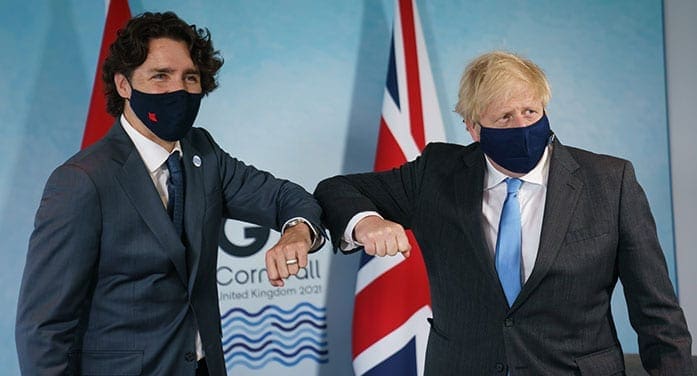 Brexit has allowed the United Kingdom to establish an independent trade policy outside the expectations of the European Union. European law and treaties signed by the EU no longer apply to the U.K.
Brexit has allowed the United Kingdom to establish an independent trade policy outside the expectations of the European Union. European law and treaties signed by the EU no longer apply to the U.K.
Accordingly, the British government signed the Trade Continuity Agreement with Canada. The agreement, which took effect on April 1, maintains the intent of the Comprehensive Economic and Trade Agreement (CETA) signed with the EU in 2016.
This new trade policy should allow the U.K. and Canada to strengthen their relations through the Commonwealth.
Trade between the two countries is significant, especially from a Canadian perspective. The prominent position of the British in the EU was an asset for Canada.
According to the Canadian government: “The U.K.’s GDP represented 18.1 percent of the EU’s total GDP in 2019 – the second-largest GDP in the bloc after Germany. Merchandise trade between Canada and the United Kingdom represented 30.1 percent of total Canadian trade with the EU between 2017 and 2019.”
In 2019, the United Kingdom was the second most popular destination, after the United States for foreign direct investment and Canadian direct investment abroad, with a share of 7.5 percent and representing a flow of $7.6 billion.
In total, the Canadian stock of foreign direct investment in the U.K. was valued at $107 billion in 2019. In 2020, the U.K. was the third destination for the exportation of Canadian goods, after the U.S. and China, with a value of $4.5 billion in the first quarter.
Canada’s trade with the U.K. (with an average value of $27.1 billion between 2017 and 2019) is bigger than the trade with Germany, at $23.9 billion. A large share of this trade is in precious metals such as gold, accounting for 60.6 percent of total Canadian exports in 2015. Gold is the most valuable mined mineral in Canada, with a production value of $10.3 billion in 2019. Ontario and Quebec accounted for more than 75 percent of the production in 2019.
The economic bond between the two countries can be reinforced by solid and historic political relations. Brexit can be an opportunity for members of the Commonwealth to strengthen their ties.
This renewed trade agreement can be an opportunity to launch the old idea of the CANZUK (Canada, Australia, New Zealand and the United Kingdom).
This proposal, intended to create free trade and free movement between these countries, is supported by politicians like Conservative Party of Canada Leader Erin O’Toole and British Prime Minister Boris Johnson. Parliament in New Zealand is also in favour of this initiative.
Some supporters want to have a more integrated zone with economic, political, social and military components to such an alliance.
For now, the British government refuses to explore the options to create a free movement area in CANZUK. Nevertheless, some measures have been taken to improve the mobility of people from these countries in the past. New improvements in this area may come.
This project can also be helpful for its members from a geopolitical perspective. With the rise of European and American protectionism, it’s more vital for Commonwealth countries to have their voices heard. Strengthening the links between them should be a priority, considering that most of them border the Pacific Ocean, the new centre of economic and political issues.
Of course, the distances between the countries are a severe obstacle. But in a more digital society, some barriers can be removed.
Like the European Economic Area, the ancestor of the EU, free trade is the pillar of cohesion. Canada and the U.K. can push this project to increase their place on the international scene.
Alexandre Massaux is a research associate with the Frontier Centre for Public Policy.
Alexandre is one of our contributors. For interview requests, click here.
The views, opinions and positions expressed by columnists and contributors are the authors’ alone. They do not inherently or expressly reflect the views, opinions and/or positions of our publication.
© Troy Media
Troy Media is an editorial content provider to media outlets and its own hosted community news outlets across Canada.



